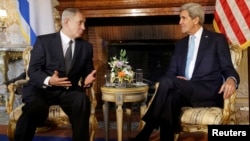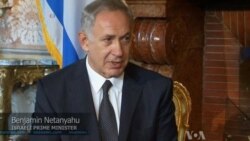ROME —
U.S. Secretary of State John Kerry has held talks with Israeli Prime Minister Benjamin Netanyahu in Rome. Iran’s nuclear program and the Middle East peace talks were on the agenda as the meeting went on for several hours. Israel is making clear its concerns about the warming of relations between Iran and the West.
Meeting at the U.S. ambassador’s residence in Rome, Secretary of State John Kerry described the talks with the Israeli prime minister as particularly timely, given the positive start to the negotiations with Iran over its nuclear program.
“While we welcome, and we do welcome, the change of rhetoric, the change of tone, the diplomatic opening that the Iranians have offered through President Rouhani and Foreign Minister Zarif, we have made clear and we are adamant that words are no substitute for actions," said Kerry.
Those actions, said Kerry, would need to make it undeniably clear to the world that Iran’s nuclear program is for peaceful purposes.
Prime Minister Netanyahu reiterated Israel’s fears that the West may be considering easing the sanctions on Iran.
“The best way to get it peacefully is to maintain the pressure on Iran. That's what got them into these renewed negotiations in the first place," said Netanyahu.
Six major powers held talks with Iran in Geneva earlier this month - the first such negotiations since Iranian President Hassan Rouhani's election in June.
Israel is in danger of becoming isolated on the issue, says Professor Ali Ansari, senior fellow at the Royal United Services Institute.
“Netanyahu and some others are taking things to an extreme. At the moment, what we’re seeing are two sort of rather passionate and heated interpretations of how to approach Iran. One of them is so optimistic and enthusiastic it’s sort of missing all the detail; the other one is fixated by the detail and can’t see the wider opportunities," said Ansari.
Ansari says that while welcoming the diplomatic détente, the West should be clear about the reasons for the change of tone from Iran.
“We’re not really seeing a new, liberal wind blowing through Iran. What we’re seeing really is an economic crisis that is really encouraging some momentum for change," he said.
Secretary Kerry also pushed for more progress in Middle East peace talks. Thirteen meetings have taken place, but Washington wants Israel and the Palestinians to reach some form of agreement within nine months.
That deadline is needed, according to Yossi Mekelberg, associate fellow at London-based policy institute Chatham House.
“If you won’t set deadlines, if you won’t set even some sense of rules in negotiating and making progress, it will go on forever," said Mekelberg.
But Mekelberg says Kerry has set a hugely ambitious agenda in the coming months.
“Running these two issues at the same time, two tracks, the Israeli-Palestinians, which no one has succeeded before him for 20 years trying to reach a peace agreement. And at the same time to deal with probably the biggest issue right now, the Iranian nuclear program. Those are massive and with both of them, the interlocutors are not easy," he said.
A second round of talks between Iran and the so-called P5+1 powers is scheduled for early next month, also in Geneva.
Meeting at the U.S. ambassador’s residence in Rome, Secretary of State John Kerry described the talks with the Israeli prime minister as particularly timely, given the positive start to the negotiations with Iran over its nuclear program.
“While we welcome, and we do welcome, the change of rhetoric, the change of tone, the diplomatic opening that the Iranians have offered through President Rouhani and Foreign Minister Zarif, we have made clear and we are adamant that words are no substitute for actions," said Kerry.
Those actions, said Kerry, would need to make it undeniably clear to the world that Iran’s nuclear program is for peaceful purposes.
Prime Minister Netanyahu reiterated Israel’s fears that the West may be considering easing the sanctions on Iran.
“The best way to get it peacefully is to maintain the pressure on Iran. That's what got them into these renewed negotiations in the first place," said Netanyahu.
Six major powers held talks with Iran in Geneva earlier this month - the first such negotiations since Iranian President Hassan Rouhani's election in June.
Israel is in danger of becoming isolated on the issue, says Professor Ali Ansari, senior fellow at the Royal United Services Institute.
“Netanyahu and some others are taking things to an extreme. At the moment, what we’re seeing are two sort of rather passionate and heated interpretations of how to approach Iran. One of them is so optimistic and enthusiastic it’s sort of missing all the detail; the other one is fixated by the detail and can’t see the wider opportunities," said Ansari.
Ansari says that while welcoming the diplomatic détente, the West should be clear about the reasons for the change of tone from Iran.
“We’re not really seeing a new, liberal wind blowing through Iran. What we’re seeing really is an economic crisis that is really encouraging some momentum for change," he said.
Secretary Kerry also pushed for more progress in Middle East peace talks. Thirteen meetings have taken place, but Washington wants Israel and the Palestinians to reach some form of agreement within nine months.
That deadline is needed, according to Yossi Mekelberg, associate fellow at London-based policy institute Chatham House.
“If you won’t set deadlines, if you won’t set even some sense of rules in negotiating and making progress, it will go on forever," said Mekelberg.
But Mekelberg says Kerry has set a hugely ambitious agenda in the coming months.
“Running these two issues at the same time, two tracks, the Israeli-Palestinians, which no one has succeeded before him for 20 years trying to reach a peace agreement. And at the same time to deal with probably the biggest issue right now, the Iranian nuclear program. Those are massive and with both of them, the interlocutors are not easy," he said.
A second round of talks between Iran and the so-called P5+1 powers is scheduled for early next month, also in Geneva.













